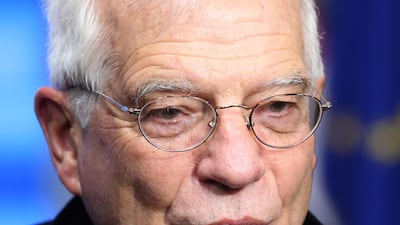EU plans to resume maritime patrols in the Mediterranean faced more delays on Monday as foreign ministers struggled to convince Austria to lift its objections in a blow to efforts to uphold a UN arms embargo on Libya.
The EU's foreign affairs chief Josep Borrell hoped that Monday's meeting of foreign ministers would agree to revive the EU's military mission, which stopped deploying ships last March after Italy said it would no longer take in migrants rescued at sea.
"I do not think today we are going to be able to (reach a final decision)," Mr Borrell said.
Italy is ready to restart the sea patrols, its vice foreign minister said last week, but diplomats said Austria was still blocking, based on its position that people rescued on the high seas should not be taken to Europe.
German Foreign Minister Heiko Maas urged the EU to agree on a mission, a day after a senior UN official warned that the arms embargo aimed at curbing fighting in Libya was meaningless because there is no one to enforce it.
"It's about the security of Europe," Mr Maas said.
On Sunday, Mr Borrell criticised Vienna, although he did not mention Austria by name, saying it was unacceptable that a country with no navy could hold up an EU sea mission.
Mr Borrell needs the backing of all 27 governments to proceed, provoking frustration among ministers.
"I cannot understand that a country like Austria at the end of the day says 'no'. We have a European responsibility," Luxembourg's Jean Asselborn said.
Austria's foreign minister did not brief the media but Chancellor Sebastian Kurz has said Austria is a "target country" for migrants seeking a better life and is opposed to the sea patrols, arguing that rescuing people encourages more to come.
"I am not convinced," Mr Borrell said.
Following a summit of world leaders last month in Berlin to seek a ceasefire among Libya's two rival governments, the EU is still seeking ways to help, possibly including a peacekeeping mission if a fragile truce becomes a ceasefire.
Vienna has so far rejected a compromise for the EU to resume work in phases, starting with air surveillance over the sea, then moving into all Libyan airspace and then with a final phase using all available EU assets on air, land and sea.


